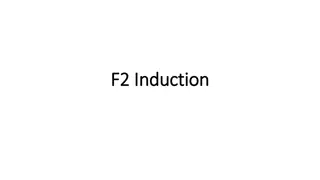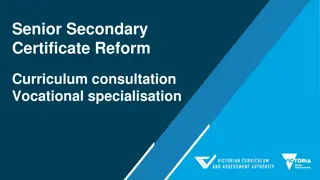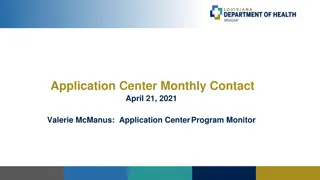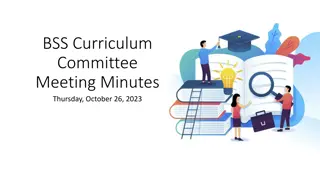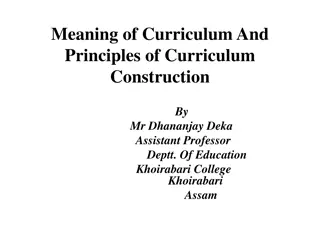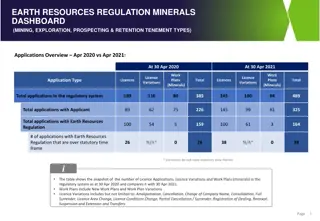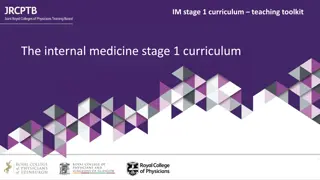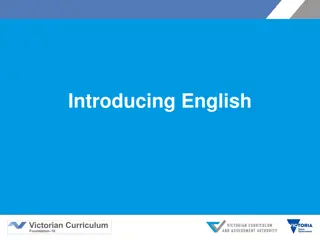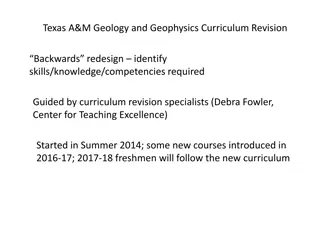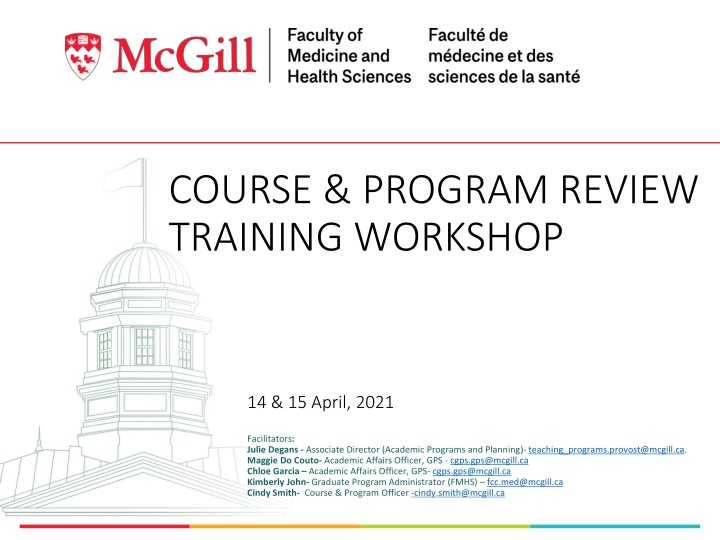
Program Review Training Workshop Highlights and Facilitators
"Discover the key goals, facilitators, and program guidelines discussed in the recent course and program review training workshop. Gain insights into submitting program changes, government requirements for graduate programs, and the various levels of program proposal reviews."
Download Presentation

Please find below an Image/Link to download the presentation.
The content on the website is provided AS IS for your information and personal use only. It may not be sold, licensed, or shared on other websites without obtaining consent from the author. If you encounter any issues during the download, it is possible that the publisher has removed the file from their server.
You are allowed to download the files provided on this website for personal or commercial use, subject to the condition that they are used lawfully. All files are the property of their respective owners.
The content on the website is provided AS IS for your information and personal use only. It may not be sold, licensed, or shared on other websites without obtaining consent from the author.
E N D
Presentation Transcript
COURSE & PROGRAM REVIEW TRAINING WORKSHOP 14 & 15 April, 2021 Facilitators: Julie Degans - Associate Director (Academic Programs and Planning)- teaching_programs.provost@mcgill.ca. Maggie Do Couto- Academic Affairs Officer, GPS - cgps.gps@mcgill.ca Chloe Garcia Academic Affairs Officer, GPS- cgps.gps@mcgill.ca Kimberly John- Graduate Program Administrator (FMHS) fcc.med@mcgill.ca Cindy Smith- Course & Program Officer -cindy.smith@mcgill.ca
Goals for the sessions Goals for the sessions Share the best ways of preparing and submitting course and program changes for timely approval Share resources and contact persons Get feedback on areas of weakness and areas for clarification in the curriculum review processes Fun and excitement! Valuable and useful information
Facilitators Facilitators Cindy Smith- Course and Program Officer, Secretary to SCTP, Office of the Associate Provost, (Teaching and Academic Programs) Maggie Do Couto- Academic Affairs Officer, Graduate and Postdoctoral Studies Chloe Garcia Academic Affairs Officer, Graduate and Postdoctoral Studies Julie Degans - Associate Director (Academic Programs and Planning)- Office of the Provost and Vice-Principal (Academic) Kimberly John - Graduate & Postdoctoral Studies Administrator, Faculty of Medicine & Health Sciences Curriculum Committee
Program topics Program topics How to prepare and submit proposal forms for new programs and concentrations, program revisions and retirements Additional requirements for new programs and major revisions: executive summary, consultations, budgetary review, etc. Government requirements and credit weightings for graduate programs
Program proposals are reviewed at many levels Program proposals are reviewed at many levels before final approval before final approval AP (T&AP) - Associate Provost (Teaching & Academic Programs) APB= Analysis Planning and Budget Office APC = Academic Policy Committee of Senate BCI = Bureau de coop ration interuniversitaire CGPS = Council of Graduate and Postdoctoral Studies (for grad progs) ES = Enrolment Services FCC- Faculty of Medicine & Health Sciences Curriculum Committee GPS = Graduate and Postdoctoral Studies Office MES = Minist re de l Enseignement sup rieur SCTP = APC Subcommittee on Courses and Teaching Programs
Approval Pathway - New program Pre-submission consultations: -Contact: CGPS, FCC, SCTP, Other faculties and depts. -Budget consultation with Faculty Financial Officer APB review of program budget FCC & Faculty Assoc. Dean DEPARTMENT CGPS SCTP APC Senate BCI MES Departmental committee and chair approvals If graduate level Up-to-date information on approval paths for courses and programs is available at: https://www.mcgill.ca/apc/files/apc/3rd_revised_streamlined_approval_paths_for_new_revised_crses_and_tea ch_progs_july_2019.pdf OR https://www.mcgill.ca/apc/
Approval Pathway Major program revision Pre-submission consultations: -Contact: CGPS, FCC, SCTP, Other faculties and depts. FCC & Faculty Assoc. Dean DEPARTMENT CGPS SCTP APC Senate MES Departmental committee and chair approvals If graduate level Up-to-date information on approval paths for courses and programs is available at: https://www.mcgill.ca/apc/files/apc/3rd_revised_streamlined_approval_paths_for_new_revised_crses_and_tea ch_progs_july_2019.pdf OR https://www.mcgill.ca/apc/
Approval Pathway Moderate and Minor program revisions, and program retirements DEPARTMENT CGPS APC / Senate FCC & Faculty Assoc. Dean APB Departmental committee and chair approvals If graduate level Up-to-date information on approval paths for courses and programs is available at: https://www.mcgill.ca/apc/files/apc/3rd_revised_streamlined_approval_paths_for_new_revised_crses_and_tea ch_progs_july_2019.pdf OR https://www.mcgill.ca/apc/
Process for new and revised program proposals Process for new and revised program proposals 1. For new programs consult Teaching & Learning Services for program design strategies at https://www.mcgill.ca/tls/instructors/course- design/program-design-strategies before completing forms. 2. Follow the up-to-date guidelines and forms for all new and revised programs at https://www.mcgill.ca/sctp/guidelines
Program forms Program forms
Guidelines for new and revised programs Guidelines for new and revised programs 3. Complete new program or program revision form and secure departmental signature in section 9.0 4. Include these attachments where relevant: Course proposal form from Minerva if new or revised courses are part of the program change. Course outlines using the TLS template Consultation with Related Units on consultation form
NOTE additional requirements for NOTE additional requirements for new programs: new programs: 5. A 2-3 page executive summary including: Rationale for new program Description of learning outcomes How program meets the needs of students, department, Faculty Demand for the program (e.g., student interest, growing markets) Professional order requirements where relevant Alignment with University or Faculty strategic plans Scan of similar programs / peer institutions Target audience and enrolment A Budget Consultation (for new programs not new concentrations) Contact the Faculty Financial Officer (FFO) to complete the APB budget template for the new program. 6. Note-A new program proposal will only be sent to CGPS or SCTP if the budget review is completed.
Faculty Faculty- -specific guidelines specific guidelines Submit the program proposal as two files to fcc.med@mcgill.ca: Editable program proposal form (ideally MS Word) One pdf of the signed program proposal form with all attachments: Executive summary for new programs and major revisions Course proposal forms from Minerva if new or revised courses are part of the program change. Course outlines using the TLS template Inter-unit and inter-faculty consultations
How do I know whether a program revision is minor or major? How do I know whether a program revision is minor or major? Major revisions include: Minor revisions include: Total revamping of the program: large number of existing courses are replaced; substantial program credit weight changes. more than 1/3 of program credits changes, changes to program s title, changes that restructure the program to have significant academic impact on students or on the program s professional accreditation, changes to project, thesis and special activity requirements in graduate programs, changes to Honours requirements in undergraduate programs. Courses added to or deleted from list of Complementary Courses; list of Required Courses credit weight increased/decreased and Complementary Courses credit weight adjusted appropriately so that the program total credit weight is not affected; Increase or decrease in the minimum program GPA requirement for Honours programs as long as the GPA requirement remains at 3.0 or greater program retirement. Moderate course revisions: changes to required course lists in a program or changes that (slightly) increase the program s credit weight
Other questions Other questions To be determined. The Office of the Associate Provost will announce. When will the hiatus on new program development be lifted? Follow the guidelines for new programs and concentrations and note : New concentrations need a minimum of 12 separate credits for the concentration. The existing program and existing options (if applicable) should also be included in section 9 of the proposal form. The proposed program should be indicated first. How to create concentrations and thesis-only programs? AVOID the term! The Ministry of Education does not approve of offering ad hoc programs. How does an ad hoc program work?
Course Topics Course Topics Course approval bodies and pathways How to prepare and submit proposals for new courses, course revisions, course retirements Faculty-level guidelines: Course regulations and other resources Course outlines- what are they and when are they required? Course submission format
Approval Pathway- courses Administering Faculty ES: DEPARTMENT SCTP /APB Final Approval APC / Senate (informed) Transcripts, Course table, Calendar updated Dep t committee and chair approvals Offering Faculty Usu. FMHS, Science, or Engineering FCC AP (T&AP) - Associate Provost (Teaching & Academic Programs) APB=Analysis Planning and Budget Office APC = Academic Policy Committee of Senate ES = Enrolment Services FCC- Faculty of Medicine & Health Sciences Curriculum Committee SCTP = APC Subcommittee on Courses and Teaching Programs Up-to-date information on approval paths for courses and programs is available at: https://www.mcgill.ca/apc/files/apc/3rd_revised_streamlined_approval_paths_for_new_revised_crses_and_tea ch_progs_july_2019.pdf OR https://www.mcgill.ca/apc/
Process for new and revised course proposals Process for new and revised course proposals 1. Consult Teaching & Learning Services for course outlines and assessment https://www.mcgill.ca/tls/instructors/course- design/outline 2. Follow the up-to-date guidelines for all new and revised courses at https://www.mcgill.ca/sctp/guidelines
Course proposal forms are on Minerva* Course proposal forms are on Minerva* * For new courses with a new subject code, use the Word or PDF course proposal form available here: www.mcgill.ca/sctp/guidelines.
3) Select New course or Course revision 3) Select New course or Course revision
4) Complete the form and submit for departmental approval 4) Complete the form and submit for departmental approval Save and submit to department for approval Departmental Curriculum Committee, Departmental Meeting, OR Departmental Chair
Process for submitting course proposals Process for submitting course proposals 5. Once complete and approved, print the Minerva form as a pdf. Attach consultations and submit as one pdf to fcc.med@mcgill.ca. 6. Course outlines must be submitted for all new courses. Course outlines must follow TLS guidelines and at a minimum contain: Clear learning outcomes Clear assessments linked to learning outcomes 7. All course proposals must be submitted by email
Faculty resources for course proposals Faculty resources for course proposals Bookmark the FCC websitefor: Faculty level guidance for submission Links to University guidance from the SCTP and CGPS Meeting dates and deadlines Committee members Administrative contact For enquiries contact- fcc.med@mcgill.ca All files must be sent to fcc.med@mcgill.ca
University resources for course proposals University resources for course proposals SCTP Subcommittee on Courses and Teaching programs Guidance documents Forms Meeting dates Meeting minutes and reports Consult Teaching & Learning Services for all program and course design support
University policies and regulations University policies and regulations McGill s eCalendar for university regulations updated annually: https://www.mcgill.ca/study/2019-2020/ Graduate Programs, Courses and University Regulations - https://www.mcgill.ca/study/2019-2020/files/study.2019- 2020/university_regulations_resources_graduate_2019-2020_2nd_edition.pdf Undergraduate Programs, Courses and University Regulations - https://www.mcgill.ca/study/2019-2020/files/study.2019- 2020/university_regulations_resources_undergraduate_2019- 2020_2nd_edition.pdf Graduate and Postdoctoral Studies Programs, Courses and University Regulations: https://mcgill.ca/study/2019-2020/files/study.2019-2020/2019- 2020_graduate_postdoctoral_ecalendar_2nd_edition.pdf University Student Assessment policy: https://www.mcgill.ca/secretariat/files/secretariat/2016- 04_student_assessment_policy.pdf Faculty of Medicine & Health Sciences (Graduate) Programs, Courses and University Regulations: https://mcgill.ca/study/2019-2020/files/study.2019- 2020/medicine_graduate_2019-2020_2nd_edition.pdf
Questions & Answers Questions & Answers How much can a course change after initial approval without needing (re)approval? Any change to the information in the eCalendar, or change to a field in Minerva form fields e.g. credit weighting requires an approved course revision. How can we deliver content to our students in another country? What are ways to exploit online resources and how should that be treated when evaluating course design? See remote / online teaching resources at Teaching & Learning Services. Why are course titles kept so short in Minerva? The software cannot accept longer titles
Faculty Faculty Curriculum Curriculum Committee Committee Ensures that course and program proposals comply with McGill University guidelines. Supports innovation and sound pedagogy in our teaching and research programs
FCC Activities FCC Activities Evaluate the academic quality of new and revised courses and programs submitted by academic units and examines : content, structure, course weights, the rationale for changes, and logistical consistency. Any inter-departmental/faculty overlaps. 8 meetings per year + 1 ad hoc meeting in the summer ~ 120 proposals reviewed annually
FCC feedback FCC feedback Decision are made by consensus to either approve, approve with conditions, or disapprove proposals. It s a good practice to respond directly and in point form to FCC comments and suggestions.
Faculty curriculum committee Faculty curriculum committee Melissa Vollrath Physiology Chair Sylvie Fournier Microbiology & Immunology Member Robert Funnell Biological & Biomedical Engineering Pharmacology & Therapeutics Member Maureen McKeague Member Maria Di Feo Ingram School of Nursing Member Maxime Denis Biochemistry Member Jason Harley Experimental Surgery Member Susan Bechstedt Anatomy & Cell Biology Member Cristina Wolfson Epidemiology, Biostatistics and Occupational Health Member Kimberly John Office of R&GS Administrator








